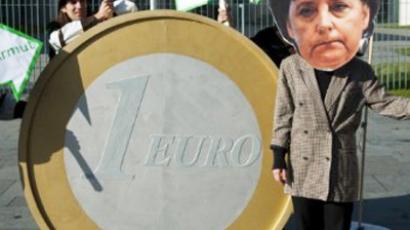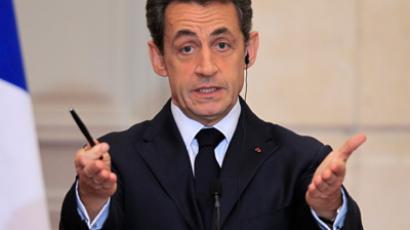EU summit: Scrabbling to extend euro road
The Merkozy plan is number one on the agenda of the rescue summit in Brussels touted the “last chance” to save the euro. But it could lead to a split of the union, if non-eurozone EU countries refuse to accept the amendments.
On Thursday, before the crucial summit, Angela Merkel and Nicolas Sarkozy held a meeting with the leaders of the European People's Party. Merkel stressed that all 27 members of the EU have a "duty" to secure the future of the euro.The two-day summit is the latest attempt to agree a deal to tackle Europe’s debt crisis and save the euro. European Commission chief Jose Manuel Barroso on Thursday urged European Union leaders to be prepared to compromise in order to protect the single currency. "The entire world is watching. We must do everything," Barroso told reporters in the French port city of Marseille, adding: "It is extremely important that we all together, all the EU, show that the euro is irreversible."Germany and France are attempting to get agreement on new European Union treaties to impose strict budget discipline and streamline decision-making. Both see fiscal integration and tougher budgets as the solution.Moreover, they are seeking to revise the 2009 Lisbon Treaty, which restructured the entire way the EU works. And that does not come easy. Especially taking into account that the EU has expanded to 27 members since the treaty was ratified. However, many of the elements of this future “fiscal union” might already be in place. European Council President Herman Van Rompuy is expected to present a document proposing a relatively minor alteration to the existing rules on fiscal discipline without wholesale change to the EU treaties.On December 5, just three days before the summit, the US credit rating agency Standard & Poor's threatened to cut the ratings of several eurozone members and the European Financial Stability Facility rescue fund.
17 or 27?
The suggestions from France and Germany, dubbed the “Merkozy” plan, include making all 17 members of the eurozone amend their individual laws so that they have balanced budgets. The European Commission would have the power to impose penalties on countries that do not stick to the new budget rules.The plan suggests that future bailouts of eurozone countries will not involve private investors as they did with Greece.The two leaders also offer to bring forward the establishment of a permanent bailout fund, or European Stability Mechanism, for ailing member states to next year from the original date of 2013.“If by the weekend there is no agreement on how we should go forward, or the agreement is very vague or not detailed enough, the markets will interpret that kind of result as more or less the end of the road for the euro,” Johan Van Overtveldt, editor-in-chief of two leading Belgian business magazines, told RT.Basically, this summit puts the European Union before a choice: to accept the French-German anti-crisis plan for all 27 EU members, or split, with the Merkozy deal only applying to the 17 eurozone states. “It is quite obvious for me that when you go for an agreement among the 17 countries you risk a stigma, a kind of separation in the European Union and end up with a kind of package for the eurozone splitting the European Union in two,” Overtveldt says. Germany wants a treaty agreed by all 27 members, which would strengthen EU institutions. It wants the Commission and the European Court of Justice given direct powers to enforce the stricter rules of budget discipline. And if the eurozone accepts the scenario of a “fiscal union”, for the 17 members it will mean giving up a big chunk of national sovereignty.“That is the basic question that is running through every sub-question which is being put on the table. And the answer to the question of whether one is prepared to give up on national sovereignty seems to be quite clear – NO,” Overtveldt predicts.
The remaining ten members of the EU now have strong concerns that they will be isolated.In a further twist, on Wednesday UK Prime Minister David Cameron threatened to veto any treaty revision if British demands are not met. If the Merkozy plan is accepted, however, the amendments would take effect in March 2012 – in the union as a whole, or just among the 17 eurozone countries.














